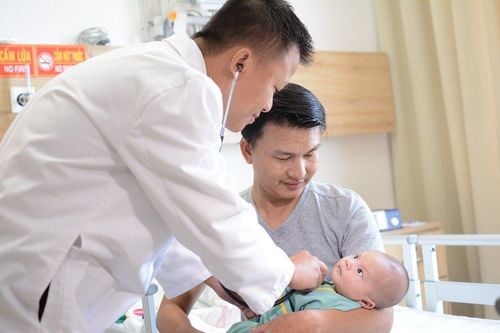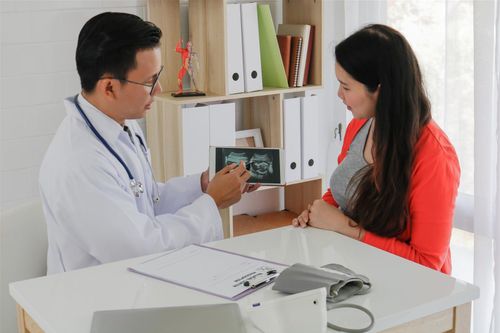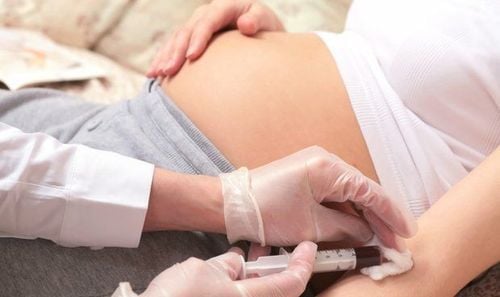This is an automatically translated article.
The article was professionally consulted by Specialist Doctor II Tran Thi Mai Huong - Department of Obstetrics and Gynecology - Vinmec Hai Phong International General Hospital.Only ten more weeks until my baby is born. The thirtieth week of pregnancy will be filled with difficulties and concerns, be prepared to face problems and learn how to make things easier for both you and your baby.
1. Thirty week fetal size
At the thirtieth week of pregnancy, the fetus is the size of a cabbage, about 1,396 kg. Although the abdomen is round and round like a whole melon inside, the length of the fetus is about 40.5 cm. As the fetus grows, the amount of amniotic fluid will decrease, which is a good sign of normal growth.Mom is preparing for the big day, baby too. By the thirtieth week of pregnancy, the fetus is usually in a head-down position. The fetus is tending to descend deeper into the mother's pelvis over the next few weeks.
30 weeks fetus eyes begin to distinguish the surroundings, light and dark. The main organs in the body are developed, the fetus will gain about 230 grams per week to ensure the development of the organ systems. You will notice that during this week of pregnancy, the fetus is less active but this is normal, because the surrounding fetus is more limited. The hearing of the 30-week fetus is developed, the mother can also see the fetus move in response to some loud noises.
2. Mother's body in the thirtieth week of pregnancy
The closer to the time of delivery, the more tired you feel, so choose a comfortable sleeping position, it is better to go to bed earlier than usual and sleep a little more in the morning. Getting enough sleep is really important for you during this period, take a nap to improve your energy.During this stage, the fetus needs more space in the mother's uterus, so the uterus will dilate below the ribs to make more room for the growth of the size of the fetus. The larger belly shifts the mother's center of gravity, making her a bit clumsy and off balance at times.
3. Mother's symptoms can be experienced at 30 . weeks
In the thirtieth week of pregnancy, you may experience some of the following symptoms:Difficulty sleeping. You will feel more tired than usual and have a harder time falling asleep, you should experiment with different sleeping positions to see if it improves, if not, see your doctor! Backache. Back pain is a very common symptom during pregnancy. Usually, back pain is worse in the third trimester.

4. Notes at 30 weeks pregnant
It is not necessary to do an ultrasound during this week of pregnancy, but your doctor may order it to check your baby's development. The contours of the baby's face are clearer, and the mother can even see when the baby opens his eyes on the ultrasound image. In addition, the mother will measure the fetal heart rate. There are two abdominal belts, one that carries a fetal heart rate monitor, and the other that measures the uterine contractions. Fetal heart rate to check that the fetus is getting enough oxygen or to detect signs of fetal distress.What mom should do:
Eat starchy foods like potatoes and cereals, eat lots of vegetables and lean meat to reduce the risk of diarrhea. Do not eat foods high in sugar. If you have diarrhea for a few days, see your doctor. Exercise regularly, walk for 30 minutes several times a week. Mom can also dance softly and go swimming. Women who are physically active during pregnancy have a shorter labor time. Get enough vitamins and minerals. Please consult your doctor about the right dose. Ask your doctor how to tell the difference between true uterine contractions and Braxton Hicks contractions. You may have painful and more frequent contractions, oftentimes that are true uterine contractions. If you're not sure if you're in labor, or you're experiencing negative bleeding or vaginal discharge, call your doctor right away!
To help mothers take care of the health of mother and fetus during pregnancy, Vinmec International General Hospital applies all-inclusive maternity health care packages with outstanding quality. Pregnant women are accompanied by experienced obstetricians and gynecologists at Vinmec throughout the process during pregnancy - labor - postpartum. Maternity packages at Vinmec International General Hospital include:
Maternity package 12 weeks Maternity package 27 weeks Maternity package 36 weeks Maternity package - labor
Please dial HOTLINE for more information or register for an appointment HERE. Download MyVinmec app to make appointments faster and to manage your bookings easily.
Articles refer to sources: Mayoclinic.org, Webmd.com, Babycenter.com, Whattoexpect.com













